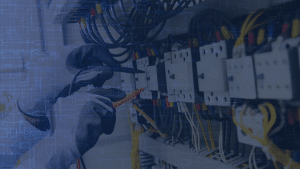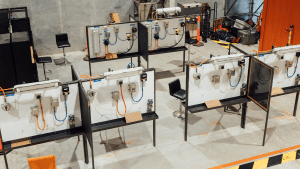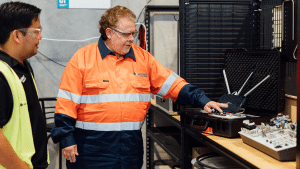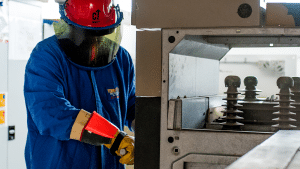As Australia strides towards a sustainable future, the role of industrial electricians and electrical engineers is becoming ever more pivotal. In the evolving landscape of the energy sector, particularly within the resource industries, electricians are at the forefront of implementing and maintaining the technologies that power progress. Over the next decade, several key skills will be paramount for electricians to effectively support this energy transition.
- Proficiency in Renewable Energy Systems: Mastery over renewable technologies such as solar, wind, and battery storage is crucial. Electricians will be expected to not only install but also optimise these systems to ensure seamless integration and efficient energy output, driving the sector towards greener solutions. (“Renewable Energy Integration for Industrial Applications,” by the Clean Energy Council).
- Command of High Voltage (HV) Systems: The transition to renewable resources often involves the management of high-voltage systems to distribute power over large areas effectively. Electricians with specialised knowledge in HV equipment will be essential for maintaining the robust infrastructure needed for this transition. (“High Voltage Training for Electricians,” by Energy Safe Victoria).
- The Role of Hydrogen and the Need for Hazardous Area Training: As hydrogen emerges as a vital component in Australia’s clean energy mix, electricians and electrical engineers will not only require the traditional applications for Hazardous Area Training in Hydrocarbons, petrochemicals and dust, but now they will have hydrogen generation and storage to consider. Hydrogen production, storage, and distribution involve unique risks due to its high flammability and the potential for explosive atmospheres. Electricians will need to be proficient in the installation and maintenance of equipment designed for hazardous environments, ensuring compliance with strict safety protocols and industry standards. This expertise will be critical in mitigating risks and ensuring the safe integration of hydrogen systems into the broader energy infrastructure, thereby supporting Australia’s transition to a sustainable energy future. (“Hydrogen Safety and Hazardous Area Classification,” by the Australian Institute of Energy).
- Expertise in Automation and Control Systems: As operations become increasingly automated, the demand for electricians skilled in the latest programmable logic controllers (PLCs) and distributed control systems (DCS) will surge. This expertise will enhance operational efficiencies and minimise downtime, making a significant impact on productivity and sustainability. (“Automation in the Mining Industry,” Mining Australia Magazine).
- Data and Communication Networks: In the digital age, robust data and communication networks are vital. Electricians will need to be adept at deploying and maintaining complex network systems that facilitate real-time data analysis and predictive maintenance, ensuring continuous operation and safety. (“Data Networks in Industrial Settings,” Journal of Industrial Technology).
- Rigorous Safety and Compliance Adherence: Given the high-risk environments of industrial settings, stringent adherence to safety and compliance standards cannot be overstated. Electricians will need to be well-versed in national and international regulations, particularly those pertaining to renewable energy technologies. (“Electrical Safety Standards in Renewable Energy,” by Safe Work Australia).
- Commitment to Continuous Learning: The rapid pace of technological advancements demands that electricians commit to lifelong learning. Staying abreast of emerging technologies, new methods, and evolving standards is essential for maintaining relevance and effectiveness in the field. (“The Importance of Continuing Education for Electricians,” by the National Electrical and Communications Association).
As Competency Training continues to champion the development of a high-performance workforce, upskilling in hydrogen-specific skills with appropriate Hazardous Area Training is a mandatory skill set for emerging and current electricians and electrical engineers. Providing targeted training opportunities will ensure the implementation of effective hydrogen systems and technologies seamlessly and allow electrical personnel to lead the charge in progressing Australia’s Hydrogen Energy transition.




